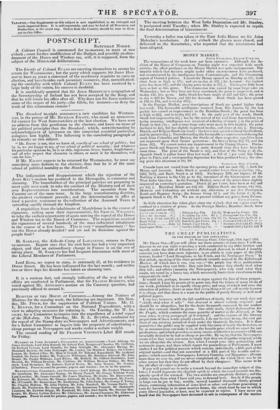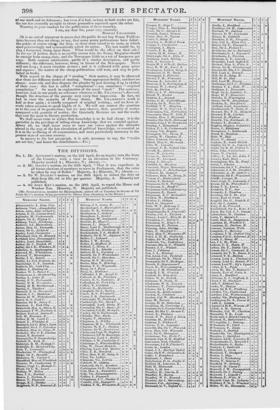THE CHEAP PUBLICATIONS.
TO THE EDITOR OF THE SFECTATOR.
19, Waterloo Place, Edinburgh, 29th April 1833.
MV DEAR Sin—If you will allow me three minutes of your time, I will en- deavour to set you right respecting a work conducted by my elder brother and myself, under the title of Chambers's _Edinburgh Journal, to which I humbly conceive you have done some injustice, in an article in your paper of the 27th instant, headed " Lord Brougham, or his Fetch, and the Newspaper Press." In that article, speaking of the sheet periodicals recently noticed by the Edinburgh Review, of which ours is one, you sty—" the people buy these publications largely because they cost little: they cost little because they chiefly steal what they sell ; and others (meaning the Newspapers), who only vend what they create, are taxed by a heavy tax, which necessarily limits their circulation to the comparatively rich." It would not, perhaps, become me to argue against the first of these proposi- tions; though I may be permiLed to point out, that the failure of many rivals of our work, published at an equally cheap price, and sonic of which had even the attraction of politics, shows at once that every thing will not sell merely because it is cheap, and that there is a want in the public of purely literary as well as of political papers.' I can say, however, with the full confidence of truth, that our work does not "chiefly steal what it sells." Our Journal is almost entirely original; and should be so altogether, but for the desire frequently expressed by our readers that a few extracts should be given. Our other work, styled .I.e jbrmotion. for the People, which contains the same quantity of matter as the joirmil, at the same price, is every paragraph of it original ; and the expense of the literary preparation of these works greatly exceeds, I do not hesitate to say, the cost per sheet of any existing periodical work under the Quarterly Reviews. It is thus proved that the public may be supplied with literature of nearly the first class, so far as remuneration can make it so, at the humble price which tee exact for our publications, and which provokes so many sneers, while other necessaries of life are invariably desired to be had as cheap as possible. By saying that the Newspapers create what they vend, you seem to imply that they are altogether original, while we are altogether the reverse. But, when I except your own painstaking and systematic paper, and those which report the proceedings of Parliament, I must confess I see few political journals which contain, individually, a fifth part of the original matter—and that not concocted at a fifth part of the trouble and ex• pense—which ours does. Newspapers, Literary Gazettes, and Magazines ; all copy more than we ever do, and are never complained of; for which there can be no other reason but that they do not offend by their cheapness. This seems to be the old affair of wipes iu Abaft.
If you will permit me to make a remark beyond the immediate subject of this
letter, I would deprecate the churlish spirit in which the taxed journals too fre- quently speak of the untaxed. The two articles are completely distinct ; and the public seems, from what I have told you, to demand both. Surely the people at large can be got to buy, weekly, several hundred thousand closely-printed. sheets, containing information of some kind or other, and perhaps generating a taste for knowledge in its more massive forms, the result must be one in which every liberal journalist, at least, may be expected to rejoice. I have never yet heard that the Newspapers have decreased in sale in consequence of the success of our work and its followers ; but even if it had, so long as both trades are fair, the one has assuredly no right to throw groundless reproach upon the other. Trusting to your candour for the publication of these remarks, I am, my dear Sir, yours very sincerely, ROBERT CHAMBERS.
[It is no sort of argument to prove that the public do not buy Penny Publica- tions because they are cheap, to say, that many penny publications have failed : the public of course selea‘s the best, or those most suited to its taste, or which
most perseveringly and systematically solicit its notice. The test would be, to clap a fourpenny stamp upon them. What would be the effect on their sale ? In the eye of justice, there is no earthly reason why the Penny Magazine should be exempt from stamp-duty, and the Newspaper liable to a tax of fourpence per copy. Both contain information, partly of a similar description, and partly different ; the difference, however, being in favour of the Newspaper. News will not keep; it must circulate at once ; and it is collected with great pains and expense : the matter of the cheap publications will wait, and may be pub- lished in books.
With regard to the charge of " stealing " their matter, it may be observed that there are different modes of stealing. Some appropriate bodily, and have no shame : some rob, and then disguise the plunder by just dressing. it up in clothes of their own : this last is called " compilation"—nay sometimes " original compilation." So much in explanation of the word " steal." The sentence, however, had, in our minds, no reference whatever to Mr. CHAMBERS'S Journal, though the structure of the passage may carry that impression. In fact, we had in view the majority of Penny sheets. Mr. CHAMBERS'S work is half as dear again ; is chiefly composed of origiiial writing ; and we have al- ready taken occasion to speak highly of it. We will not contest the assertion as to the cost of its production ; but we may observe, that, quantity of matter compared with quantity of matter, the Quarterly Reviews are not the works that cost the most in literary.production. We shall never cease to rejoice that knowledge is to be had cheap : it is the partiality in the privilege of selling cheap knowledge that we contend against Above all, we shall never cease to raise our voices against the obstacles placed in the way of the free circulation of political knowledge, so essential as rt is to the wellbeing of all communities, and more particularly necessary in the present state of our own country. In answer to the last paragraph, it is only necessary to say, the " trades are not fair," and hence the churlishness.—Em]



















 Previous page
Previous page